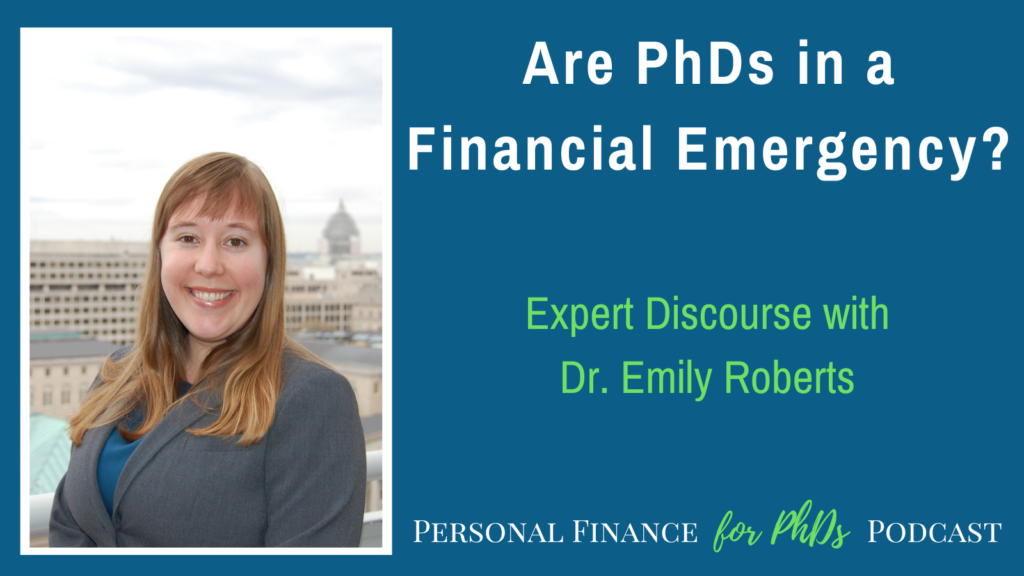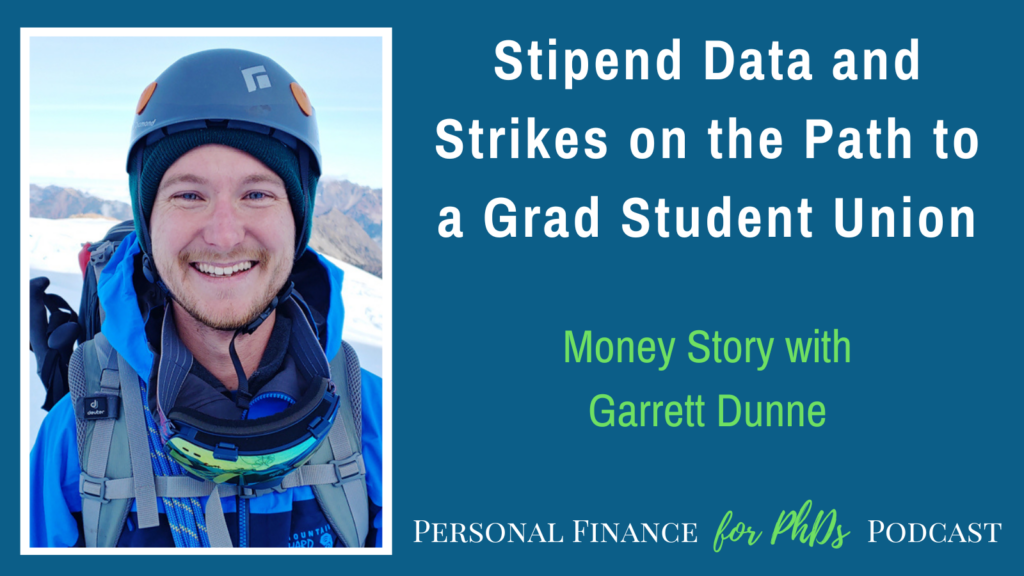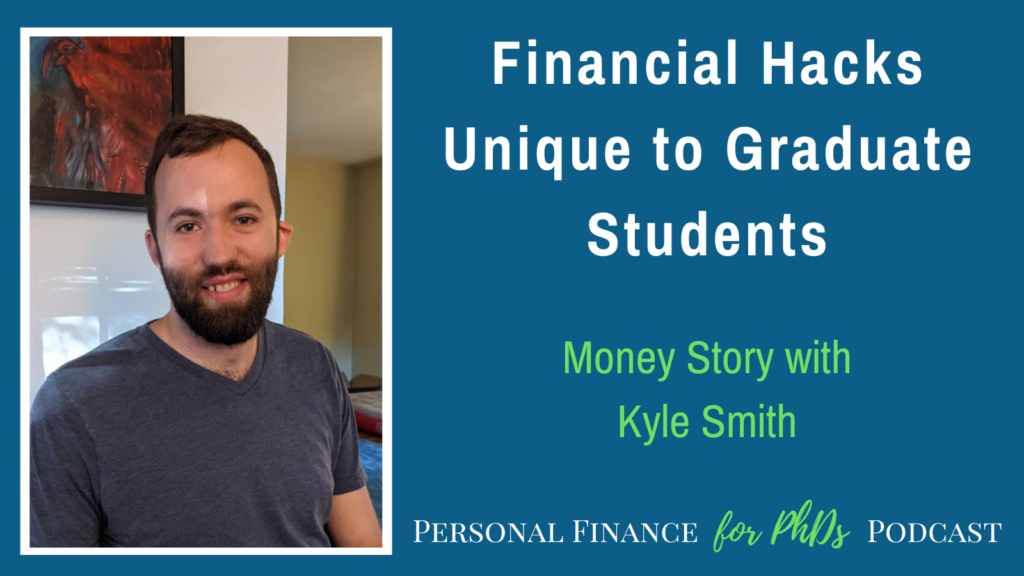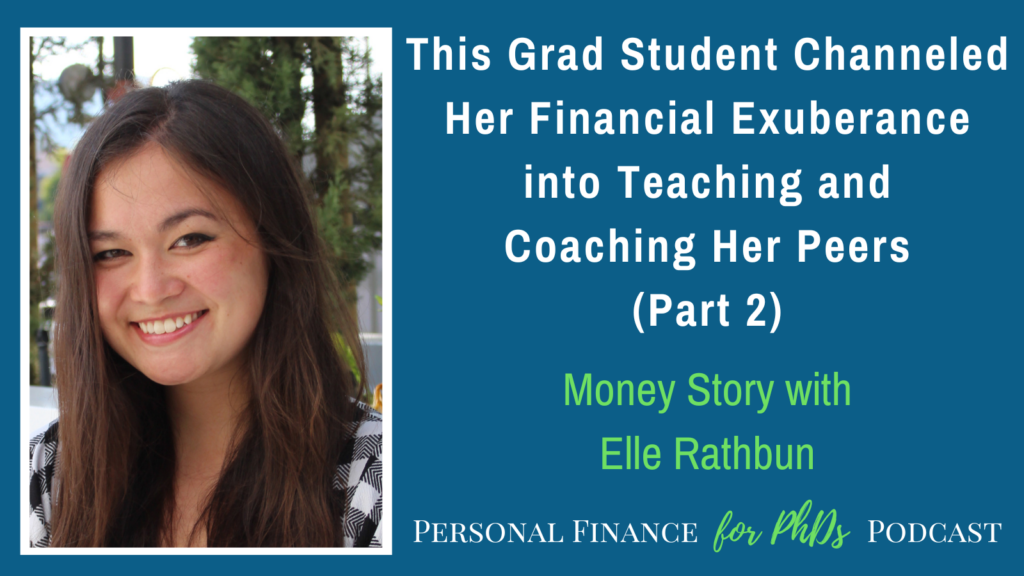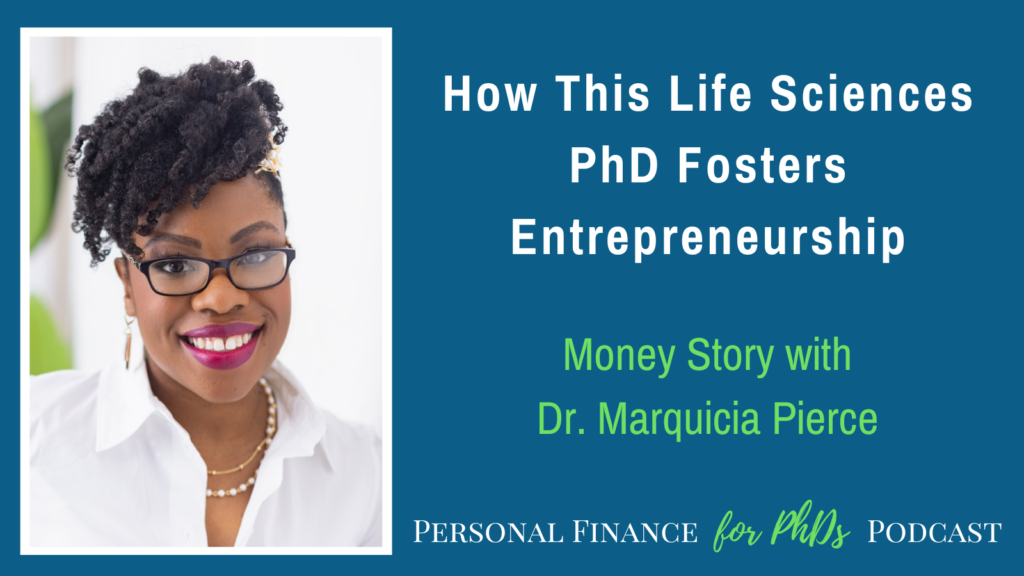In this episode, I share what I’ve learned recently about the landscape of postdoc benefits in the US, specifically with respect to health insurance and workplace-based retirement accounts. This discussion of employees and non-employees or fellows may be familiar territory to some of you, but I also know I’m reaching people who have never heard it before. I hope that this episode helps more postdocs access more benefits, but I will not present a single universal solution that can be immediately adopted. Please take what you learn today back to your peers at your institution to converse about what they’re doing for their benefits and what may be possible for all of you.
Links mentioned in the Episode
- PF for PhDs S2E3: Using Data to Improve the Postdoc Experience (Including Salary and Benefits)
- PF for PhDs S14E3: The Tax and Retirement Effects of Receiving Fellowship Funding
- PF for PhDs S8E10: How This Grad Student’s Finances Changed During the Pandemic
- Host a PF for PhDs Seminar at Your Institution
- Emily’s E-mail Address
- NIH Policies for NRSA Stipends, Compensation and Other Income: Notice number NOT-OD-23-111
- Code of Federal Regulations: Part 66 National Research Service Awards
- NIH Grants Policy Statement 11.2.9.2
- NIH Grants Policy Statement 11.3.8.2
- PF for PhDs Subscribe to Mailing List
- PF for PhDs Podcast Hub
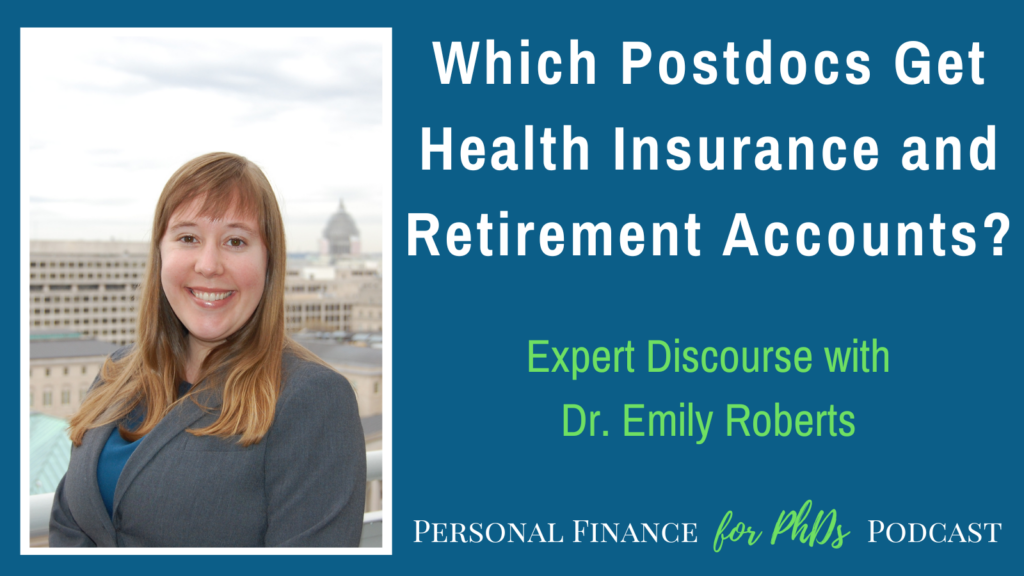
Teaser
Jamie G: “as a postdoc, I mean, yes, your benefits are important, but you’re so, uh, worried about all of the work that you have to get done scientifically. So I think, you know, doing all this extra administrative stuff falls by the wayside more often than not.”
Introduction
Emily: Welcome to the Personal Finance for PhDs Podcast: A Higher Education in Personal Finance. This podcast is for PhDs and PhDs-to-be who want to explore the hidden curriculum of finances to learn the best practices for money management, career advancement, and advocacy for yourself and others. I’m your host, Dr. Emily Roberts, a financial educator specializing in early-career PhDs and founder of Personal Finance for PhDs.
Emily: This is Season 21, Episode 3, and today is a mostly solo episode from me plus some short interview segments on what I’ve learned recently about the landscape of postdoc benefits in the US, specifically with respect to health insurance and workplace-based retirement accounts. This discussion of employees vs. non-employees or fellows or trainees may be familiar territory to some of you, but I also know I’m reaching people who have never heard it before with some bright spots. I hope that this episode helps more postdocs access more benefits, but I will not present a single universal solution that can be immediately adopted. Please take what you learn today back to your peers at your institution to converse about what they’re doing for their benefits and what may be possible for all of you together.
Emily: If you’ve been enjoying this podcast, would you please take a moment to leave a review on Apple Podcasts, Spotify, or wherever you listen to podcasts? I just caught up on the reviews on Apple Podcasts after a few years, and they really put a smile on my face. Leaving a review also helps other PhDs and PhDs-to-be find this podcast. Thank you very much! You can find the show notes for this episode at PFforPhDs.com/s21e3/. Without further ado, here’s my episode on postdoc benefits.
First Encounters with Postdoc Employee/Non-Employee Differential Benefits
Emily: I’ll start today’s episode with how I first personally encountered this postdoc employee/non-employee differential benefits weirdness. After my husband defended his PhD, he wanted to get a couple more papers published before applying for jobs or other postdocs, so he arranged to stay in his PhD advisor’s lab as a postdoc until he could finish those up. As his graduate appointment was ending, his advisor gave him three choices as to how he could be hired as a postdoc. All three paid the same gross income.
Emily: First, he could be hired as a fellow aka non-employee. That meant he would have to pay for his health insurance premium out of his income and he would not have access to the university 403(b). Second, he could be hired as an employee. That meant his health insurance premium would be paid on his behalf and he had access to the university 403(b). Third, he could be hired as a contractor. That meant he would have to pay for his health insurance premium out of his income and he would not have access to the university 403(b). The tax implications are also different across these three appointments with respect to the employee and employer sides of FICA aka Social Security and Medicare tax, each 7.65% of his income. As a fellow, neither he nor the university would pay FICA tax. As an employee, his employer would pay their half and he would pay his half. As a contractor, he would pay both halves.
Emily: We thought this was such a strange offer! Since the gross income was held steady across all three, it was clear that the employee position was superior due to the cost of the health insurance, and we definitely wanted the 403(b) benefit, even though there was no match. If he had been offered more money for the fellow or contractor positions as compared to the employee position, maybe we really would have had to weigh the choice, but not as it was presented. It was such a stark difference that we wondered if we were missing something—why wouldn’t he choose the employee position, why was this even under discussion?
Emily: Now, when I look back on this offer, what I find remarkable is not the lack of benefits for the non-employee positions or that the same amount of money was offered, it’s that my husband’s advisor gave him a choice at all. Up until recently, I perceived the postdoc position as falling into one of two broad categories. This was based on my examinations of the benefits offered to postdocs at universities that hired me to speak, if the subject matter included a discussion of retirement accounts. Postdocs could be employees with all the attendant benefits such as employer-provided health insurance, access to the workplace-based retirement account, perhaps an employer-provided retirement account contribution, formal vacation and leave policies, etc. These might be the same suite of benefits offered other staff or faculty members or a modified one. Or postdocs could be non-employees who did not have access to the workplace-based retirement account, had to pay for their health insurance premium out of their own pockets—which was not a tax-deductible expense—and probably did not have the protections that a regular employee would. The only monetary upside to being a fellow over an employee is that your income is not subject to FICA tax, meaning that you don’t have to pay 7.65% of your income in that particular payroll tax. However, the flip side is that you don’t get Social Security credit for those quarters either, so that’s really a double-edged sword.
Postdoc Benefits Examples From the Academic Community
Emily: Way back in Season 2 Episode 3, Dr. McDowell, who at that time was the executive director of Future of Research, shared his observation that
Gary M: “Benefits is just a whole minefield…”
Emily: I also thought that your funding source completely determined your status—that postdocs who won individual fellowships or were on institutional training grants had to be classified as non-employees. This view was supported as I heard from postdocs who were shifted from one classification to the other within the same institution; for example, postdocs who started out as employees and then were switched to non-employees when they won a fellowship or were put on a training grant.
Emily: Dr. Jamie Lahvic gave us an example of this occurrence during our interview in Season 14 Episode 3:
Jamie L: “And then as a postdoc, I did have a retirement account offered. However, I started out by like not really contributing very much to it at all because I was living in this really high cost-of-living area with not a lot of income. And then I actually found out as I was going through the fellowship application process that I was going to be losing that retirement contribution once I got a fellowship coming in. So then I sort of, at the last minute just before my fellowship came in, I like maxed out all my contributions as best as I could for like the last few months and tried to top it off. But then the fellowship came in and those accounts kind of sat stagnant for the rest of my postdoc.”
Emily: For this episode, I spoke with Dr. Jamie Garcia, who is the Associate Director of Scientific Partnerships and Engagement at the Jane Coffin Childs Memorial Fund for Medical Research. She confirmed that
Jamie G: “ more often than not, we do see that once they’re awarded the fellowship. There is this shift from university employee to now, I guess maybe like a trainee classification, which is seen, um, you know, if you get it on a training grant or if you are awarded an f, you know, you, you suddenly lose your employee status. And unfortunately with that. A lot of times things such as contributing to retirement is no longer on the table. Um, medical and dental can be compromised in some way, shape or form. Um, and even, even things we’ve had fellows come to us about, such as being able to park on university campus. So we’ve really seen a wide array of employee benefits get stripped away.”
Emily: However, in recent years, I’ve realized that the postdoc benefits landscape is much more varied than my initial impression. Postdocs care a lot about receiving benefits, and in some cases they and their institutions have found ways to mitigate the issues caused by being classified as a non-employee or even changed the classification altogether. I do want to point out before we start that term employee is a bit tricky and used differently in different contexts, such as tax vs. labor. For myself, I’m tax-focused, so I go by IRS-related classifications. If you are a US citizen, permanent resident, or resident for tax purposes, and your income is reported on a Form W-2 and you have access to a workplace-based retirement account, perhaps after a waiting period, I would call you an employee. For nonresidents, your tax reporting might be on a Form W-2 or a Form 1042-S with income code 19 or 20. If your income as a US citizen or resident is reported in some other way and you don’t have access to the workplace-based retirement account, I would call you a non-employee, at least with respect to that income. For nonresidents, if your tax reporting is on a Form 1042-S with income code 16, I would call you a non-employee. Income tax withholding for US citizens and residents falls similarly: if you’re an employee, your income tax will be withheld on your behalf, and if you’re a non-employee, it might not be withheld on your behalf. If you’re a nonresident, it’s going to be withheld either way.
Emily: I need to define another term here: workplace-based retirement account. I’m using this as a catch-all term for 403(b)s, 457s, and state-sponsored retirement plans, whichever applies at a given institution. An IRA, individual retirement arrangement, is not tied to your workplace. The postdoc benefits situation is considerably different than the grad student benefits situation, even though either might be classified as employees or non-employees. Grad student benefits are more similar across the board, whereas for postdocs there can be a vast difference between being classified as an employee vs. non-employee. I’m painting with a broad brush, but it seems to me that grad students are always offered student health insurance. If they opt in, the health insurance premium is typically paid in full or in large part on their behalf, and it is not included in their taxable income, and that applies whether they are employees or non-employees. For postdoc employees, their employee health insurance premiums are paid at least in part by the employer, and the premiums are not included in their taxable income. For postdoc non-employees, the premium might be paid for from a separate stipend or they might pay for it out of their regular income, but either way the money that pays the premium is supposed to be included in their taxable income. I’ve even come across postdocs who are not offered a reasonably priced health insurance plan by their universities, so they go through the marketplace to purchase insurance.
Emily: Grad students are not typically given access to their university’s retirement account, whether they are employees or non-employees. In certain circumstances, grad student employees are granted access, like Eun Bin Go, whom I interviewed in Season 8 Episode 10, but it’s quite rare that any grad students actually contribute to the plan. I have never come across a full-time grad student who receives a retirement contribution match. Postdoc employees are typically given access to their university’s retirement account, sometimes after a waiting period, and they sometimes receive an automatic or a matching contribution from their employers. Postdoc non-employees are not given access to their university’s retirement account. When it comes to FICA tax, grad students virtually never pay FICA tax, regardless of their classification, whereas postdoc employees pay their half of the tax and postdoc non-employees don’t pay the tax. Grad students may have little awareness of whether they are considered employees or non-employees, because the benefits difference is negligible to non-existent. In fact, if anything, it’s preferable to be a non-employee on fellowship, because that typically translates into a larger stipend. Speaking for myself, I barely registered when my status changed back and forth during grad school because it didn’t impact my pay, benefits, or day-to-day work. However, postdocs absolutely notice these differences in benefits when they are hired or when they switch, and all too often, the pay is held constant between the two classifications.
Commercial
Emily: Emily here for a brief interlude. Would you like to learn directly from me on a personal finance topic, such as taxes, goal-setting, investing, frugality, increasing income, or student loans, each tailored specifically for graduate students and postdocs? I offer seminars and workshops on these topics and more in a variety of formats, and I’m now booking for the 2025-2026 academic year. If you would like to bring my content to your institution, would you please recommend me as a speaker or facilitator to your university, graduate school, graduate student association, medical school, postdoc office, or postdoc association? My workshops are usually slated as professional development or personal wellness. Orientations, postdoc appreciation week, or close to the start of the academic year would be a perfect time for tax education or general personal finance content. Ask the potential host to go to PFforPhDs.com/financial-education/ or simply email me at [email protected] to start the process. I really appreciate these recommendations, which are the best way for me to start a conversation with a potential host. The paid work I do with universities and institutions enables me to keep producing this podcast and all my other free resources. Thank you in advance if you decide to issue a recommendation! Now back to our interview.
How Can Postdocs Who Are Classified as Non-employees Gain Some Employee Benefits?
Emily: First, I’m going to address how postdocs gain benefits at institutions where they are by default classified as non-employees based on their funding source. Second, I’m going to point out that some institutions classify all postdocs as full employees regardless of their funding source. Part 1: How can postdocs who are classified as non-employees gain some employee benefits?
Emily: My curiosity into this question was piqued within the last year when I independently conversed in detail about benefits with two different postdocs at Emory. Both were funded by fellowship/training grant-type funding, so both were primarily classified as non-employees. However, they both accessed a workaround available at Emory, namely being given a very part-time employee appointment so that they could maintain their health insurance benefit and access to Emory’s 403(b). The second postdoc I spoke with, Dr. Celina Jones, asked me if I knew of postdocs on NIH fellowships and training grants who received a retirement contribution match from their institutions, and I offered to ask my mailing list about it. This is the text of the email I sent on January 16, 2025:
“Do you receive a retirement match and if so HOW?
I had a request for information come in from Dr. Celina Jones, who is a postdoc at Emory on an F32.
Celina started off as a postdoc employee at Emory with all the attendant benefits. When she switched onto her F32, she and her PI created a workaround so that she can still access employee health insurance and the 403(b)… but her efforts to retain her retirement match have been stymied.
Celina and I want to know: Do any other postdocs on NIH training grants receive a retirement match from their institutions? She would love to bring some examples back to Emory to advocate for this benefit.
It’s a no-brainer to me that postdocs should not LOSE benefits (read: money) when switching from employee to non-employee status—if anything, they should receive a pay increase or bonus—so I really want to know if solutions are out there!
Please email me back if you have a relevant example!
Emily”
Emily: The responses I received from postdocs underlined that the workaround these Emory postdocs used was not known to everyone. Several respondents confirmed that they had lost their benefits when switching from employee to non-employee status, with no workarounds offered. A couple of grad students replied with outrage and concern that this was an issue their peers were facing and that they might face in the future. Dr. Richard Remigio, a postdoc at NIH, replied “If matching is considerably important, I often hear awardees declining their award so they can remain on their university’s payroll and list the offered award in their CV.” What a sad situation when an award offers prestige but not only no material benefit but actually a material detriment. Jamie Garcia with the Jane Coffin Childs Fund explained how she’s seen this workaround applied at numerous universities:
Jamie G: “ we’ve also had a little bit of restructuring of the award such that. Um, 80% of the money coming from us, um, goes to the institution, or sorry, goes to the individual and then 20% comes from the lab. And so since it’s split up, that’s sufficient enough to help, um, or keep an individual as an employee.”
Emily: I asked Jamie if she had yet come across an institution that would not set up this workaround, if requested, and she said she had not, which is very encouraging. However,
Jamie G: “ every single individual appointment it, it’s on a case by case basis. We have not become efficient enough yet with our fellows, at least to. Um, you know, kind of have this blanket application. Um, so it is a lot of work, uh, on the, on the front end with each individual to make sure that they’re getting what they need to be getting to not only be successful in the lab, but in their personal life as well.”
Emily: But something else I’ve realized, and that Jamie Garcia confirmed, is that not all postdocs are left to workarounds vs. staying as complete non-employees.
Where Are All Postdocs Classified as Employees?
Emily: As I said earlier, I originally thought that the source of a postdoc’s funding determined their employee or non-employee classification, and that receiving funding from an NIH fellowship or institutional training grant meant that you had to be a non-employee. However, two years ago, the NIH made a splash with this innocuously phrased notice. Notice number NOT-OD-23-111 is titled “NIH Policies for NRSA Stipends, Compensation and Other Income” and reads:
“The purpose of this Notice is to remind the extramural community of the policies surrounding stipends, compensation and other income for trainees and fellows supported under Ruth L. Kirschstein National Research Service Award (NRSA) grants.
In accordance with 42 CFR Part 66, NIH provides stipends to NRSA fellows and trainees as a subsistence allowance to help defray living expenses during the research training experience. NIH does not provide stipends as a condition of employment with either the Federal government or the sponsoring institution (See NIH Grants Policy Statement 11.2.9.2 and 11.3.8.2).
While stipends are not provided as a condition of employment, this policy is not intended to discourage or otherwise prevent recipient institutions from hiring NRSA trainees and fellows as employees or providing them with benefits consistent with what the institution provides others at similar career stages.”
Basically, the NIH was saying, “Hey universities, we never said that you couldn’t hire NRSA fellows and trainees as employees—you totally can if you want to.” Even the end of the notice seems like a nudge to universities to provide benefits to NRSA recipients that are commensurate with those provided to other postdocs. After seeing that notice, I wondered whether any institutions had already been hiring NRSA postdocs as employees or started after the reminder. So at this year’s National Postdoctoral Association Annual Conference and Graduate Career Consortium Annual Meeting, I asked people I met who work in postdoc offices about postdoc benefits and whether all of their postdocs were hired as employees. I actually did meet a few people who confirmed that all of the postdocs at their institutions were hired as employees. For one example, MD Anderson Cancer Center in Houston, TX. At the Graduate Career Consortium Annual Meeting, Briana Mohan, the Program Manager of Recruitment & Special Programs in the Office for Postdocs, spoke with me at length about all the postdocs being employees. Dr. Ryan Udan, the Program Director for Academic Operations in the Office for Postdocs described all their benefits. The following audio clip will also appear in a forthcoming podcast episode about on-campus resources.
Ryan U: “Our employees and trainees have equal access to these benefits…”
Emily: Amazing! It’s great to hear that some institutions are looking out for all of their postdocs and trying to give them a really positive workplace experience.
Conclusion
Emily: So now I’ve learned, and perhaps you have as well, that being awarded an NIH NRSA or similar fellowship or grant as a postdoc does not mean that your position will lack the benefits that your postdoc employee peers have. At some institutions, the funding source makes no difference as all postdocs are employees. At others, you can be hired as a part-time employee to get some of the benefits. However, there are apparently still a lot of postdocs who are dealing with being classified as a non-employee and not receiving benefits. If you’re in this situation currently or you’re anticipating taking a postdoc position in the future, what can you do to give yourself a better chance of getting the same or almost the same benefits as the postdoc employees?
Emily: First, if you’re searching or interviewing for postdoc positions, consider targeting institutions where all postdocs are hired as employees or where there is an established workaround. Second, again during the interviewing process or after being hired, try to find the right administrator at the institution who can help you with your classification or a workaround.
Emily: Jamie Garcia shared that she helps her fellows do this:
Jamie G: “ I think if you can identify the right people to talk to, which is easier said than done, um, I, I believe that people want to help. The postdocs, you know, I don’t, I don’t think that they’re out to, you know, make their lives harder. It’s just following protocol, right. So ”
Emily: However, Jamie observed that this is a bit easier for an outside funder acting as a liaison to do because they have more experience and ongoing relationships, plus
Jamie G: “ as a postdoc, I mean, yes, your benefits are important, but you’re so, uh, worried about all of the work that you have to get done scientifically. So I think, you know, doing all this extra administrative stuff falls by the wayside more often than not.”
Emily: Third, if you’re already in a postdoc position as a non-employee, talk with your peers about their funding sources and benefits, such as through the postdoc association or union. You may find that a workaround can be put in place for you and your peers in a similar situation. This becomes more and more likely the more people speak up about this issue and point to solutions at other institutions. Jamie Lahvic from Season 14 Episode 3 also spoke to this approach during our interview:
Jamie L: “I think great groups to kind of connect to for that are unions. Within the UC system, we have a strong postdoc union. And I think they had done a lot of pushing, you know, both on how much you get paid, but also a lot of these minute policies about how you get paid. And so I wouldn’t be surprised if the more streamlined system came about because of pressure from the union. And I’d be interested to know what other, you know, grad student unions and postdoc unions are where they’re having successes… I mean, even outside of a formal union, I’ve seen a lot of success from graduate students and postdocs just banding together and working together on these things. Whether that is kind of peer-to-peer advice and providing resources, or working together as a group to request something from your department, from your university. You know, I have so many memories of like trying to do my taxes, trying to fill in the forms, and getting like frustrated and upset and not knowing what to do. And I think like you have peers who can help you through some of those things and at least to help you feel supported.”
Emily: Fourth, if you can’t be hired as an employee and no workaround is available, you can attempt to negotiate for more money. Calculate the amount of money that you are losing compared to your employee peers with respect to your health insurance premium and its tax payment and the retirement account match. Ask for that much or more to be added to your salary. Honestly, if you’ve won an individual award and are bringing outside money to your institution, you should be paid even more than employees after normalizing for all benefits, and this does happen sometimes, although it may not be typical. Gary McDowell from S2 E3 observed that:
Gary M: “A lot postdocs are negotiating… who’s not asking.”
Emily: If all postdocs at your institution are on a set pay schedule and individual negotiations are not permitted, that’s all the more reason to get together with your peers to argue that all postdoc non-employees should receive a pay increase and/or additional benefits. Please let me know your reaction to this episode! Tell me about your workarounds or which institutions hire all postdocs as employees. You can reach me at [email protected].
Outro
Emily: Listeners, thank you for joining me for this episode! I have a gift for you! You know that final question I ask of all my guests regarding their best financial advice? My team has collected short summaries of all the answers ever given on the podcast into a document that is updated with each new episode release. You can gain access to it by registering for my mailing list at PFforPhDs.com/advice/. Would you like to access transcripts or videos of each episode? I link the show notes for each episode from PFforPhDs.com/podcast/. See you in the next episode, and remember: You don’t have to have a PhD to succeed with personal finance… but it helps! Nothing you hear on this podcast should be taken as financial, tax, or legal advice for any individual. The music is “Stages of Awakening” by Podington Bear from the Free Music Archive and is shared under CC by NC. Podcast editing by me and show notes creation by Dr. Jill Hoffman.
